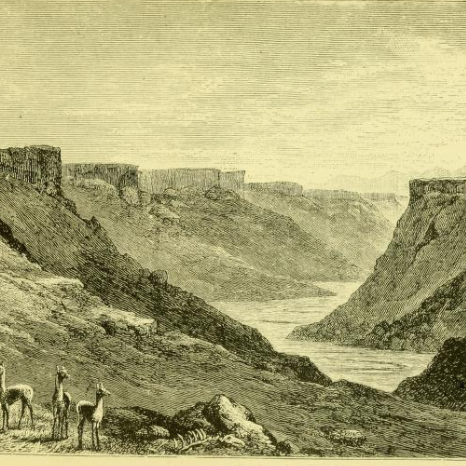
Lady Florence Dixie was a Scottish writer, feminist, and activist born in 1857. Always interested in outdoor activities, she set off in 1878 with her husband, brothers, and a friend to ride on horseback for across the region of Argentina and Chile called Patagonia. Across Patagonia, the book she wrote about their journey, describes the journey to Argentina, and then follows her ride across harsh and beautiful landscapes as she encounters people, scenery, animals, and natural obstacles.
Lady Florence Dixie’s account of her travels is indicative of 19th century European views of Latin America. The most glaring example is how she writes about Indigenous people, detailing their appearances as if studying another species. Never calling them “people” but always “Indians,” Lady Florence also describes their language as “guttural grunts” and “jabbering,” before explaining their lifestyles, despite not spending enough time with them to properly understand it (Dixie 64-69). Much of the travelogue is also concerned with hunting. Despite later spurning the activity and becoming a vegetarian, at the time of her Patagonia trip Lady Florence saw the natural world only as a resource for her own consumption. On page 166, for example, she hunts foxes and wishes to “make a collection of their skins, and carry them back to England to be made up into rugs and other useful articles.” In these two examples, Lady Florence has power over both people and resources because she is a white European with enough money to travel. Though her rights were restricted because of her gender, the privilege she gained from her race was immense.
Across Patagonia is evidence that 19th century Europeans viewed Latin America as an exotic land rich with resources for them to use. Many Argentinians in the 19th century bought into the idea that people of different races were completely different from each other and perpetuated the white supremacy that Lady Florence Dixie demonstrates. The country welcomed European immigrants in order to gradually “whiten” the population. Additionally, the idea that Latin America’s resources were there for European use resulted in neocolonialist practices. In Argentina, as elsewhere, Europeans invested in industry and built railroads, creating an export economy reliant on European trade. All of this added up to help create the world dominated by European thought and technology we know today.
Sources:
Chasteen, John Charles. Born in Blood and Fire 4th ed. W.W. Norton & Company, 2016.
Debelius, Margaret. “Dixie, Lady Florence 1857-1905.” In The Cambridge Guide to Women’s Writing in English, edited by Lorna Sage, Germaine Greer, and Elaine Showalter. Cambridge University Press, 1999. Online at Credo Reference.
Dixie, Florence. Across Patagonia. New York: R Worthington, 1881.
“DIXIE, Florence Caroline (Florrie), Lady.” In The New Biographical Dictionary of Scottish Women, edited by Elizabeth Ewan, Rose Pipes, and Jane Rendall. Edinburgh University Press, 2018. Online at Credo Reference.
